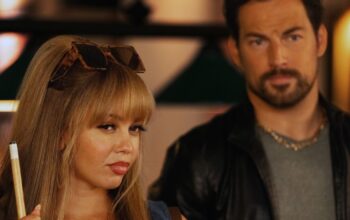Summer TV is about to get a bit more supernatural thanks to Midnight, Texas. Based on the books by Charlaine Harris (the creator of the Sookie Stackhouse novels that became True Blood), it’s the story of a remote Texas town that is a sanctuary for some very unique folks. When the town is of Midnight threatened, the residents put their differences aside and unite against these outside forces.
Here’s what we learned about Midnight, Texas from showrunner Monica Owusu-Breen, and stars Arielle Kebbel and Peter Mensah during a round table interview at the ATX Television Festival. And be sure to watch the series premiere tonight at 10/9c on NBC in the U.S., and at 9pm ET/PT on Global TV in Canada.
Owusu-Breen knew that the Midnight, Texas universe was special before signing on to the series.
“My agent sent me a book and said, ‘Look at this. Does this intrigue you?’ And I read two chapters and said, ‘It does intrigue me.’ I knew True Blood, so I was a little scared because that’s big shoes to fill. But Midnight was so special, and so singular, and such a very different place. It felt like it was in a similar universe, but still different and with different stories to tell. For me, it was the best of all worlds because Charlaine [Harris] writes my favourite genres: romance, supernatural, and westerns.
Some viewers might want to write this off as another True Blood, but Mensah shared what sets Midnight, Texas apart.
“Without a question, this is a very different community. The stories aren’t just about their relationships. It’s essentially about what happens to the community, and how their relationships are tested by external stuff as much as their internal relationships. You see more multilayered character development because the stories are far more demanding than basic attractions and power struggles.”
For those who have read the books, the casting of Peter Mensah as Lemuel may have been surprising. Owusu-Breen shared a bit about why he got the role.
“Lemuel is a very unique character, and in the book he was described in a way that’s very different. I wanted to keep the spirit of Lem. He is wise and compassionate and smart, and doesn’t sweat anything because he’s been around for hundreds of years. He’s kind of got a dark sense of humour that I really liked. Honestly, we had really open casting. I wanted to find Lem’s spirit, and sometimes if you are limited by physical appearance, you don’t get the actor who brings the role to life as much. For me, it was important to get Lem’s heart. It doesn’t beat, but it’s there.”
The relationship between Olivia and Lem in the books is rather steamy, and Owusu-Breen told us a bit about how what they were able to get away with on a network like NBC.
“We go as far into the line as we can. What I loved about Charlaine’s characters is even though they’re supernatural, they’re really human. They love making love. They love hanging out at a restaurant and talking to their friends. They drink and they take pills when they have headaches. They’re human in as much that supernatural beings can be human. For me, it was important that these characters have sex, but the show is not about that. True Blood was about sex. Sex is part of the human condition, the fabric of what makes us human.”
As much as it’s Kebbel’s job to help bring her character to life, she knows that it’s just a small part of the series.
“Obviously it’s my job to understand my character and create the relationship with Lem and Olivia, but there’d be times where I would totally understand what [other characters] were going through. Supernatural or not, this is about love and feeling and family and connection. Everybody will be able to relate to what these people are going through. It’s really important, especially with what we’re going through right now in our world.”
Shows like this are able to hold a mirror up to society because they are set in a fantastical world. In the books, there’s a community where the people put their differences aside to coexist in peace. Owusu-Breen explained how that aspect of the books translates to the series.
“With supernatural shows, if you don’t have some sort of metaphor guiding you, it can devolve into itself. Really different people all come to this community — each with their own reasons why they’ve chosen this remote place in Texas — and they’re so different and don’t always agree with each other. There’s something to be said for having a vested interest in protecting your community and not judging other people. Fiji (Parisa Fitz-Henley) and Olivia are extraordinarily different. They don’t live by the same code, but Fiji loves Olivia as a friend and Olivia loves Fiji. You can be so different without being judgmental. There’s a kindness in these books that I really appreciated. It felt aspirational and joyful, and it wasn’t just sad.”
Mensah also appreciates the storytelling freedom that comes with genre shows.
“I’ve always enjoyed these types of shows because it allows for a conversation about very different aspects of society without actually stating that this is what we’re talking about.”
There’s an outside force that threatens Midnight, and Kebbel explained how it brings everyone closer together.
“First you have the differences in the characters within the town, and then there’s this outside force. All of a sudden, these characters have to put aside their differences because there’s a greater purpose. They learn to work together and actually appreciate each other’s differences. It’s incredibly important that they call upon each other’s differences when push comes to shove to beat this outside force that’s trying to beat them down. I loved that message. It was like time and time again, whether we understood each other or not, we became the light facing the dark. That makes me proud to be a part of this show.”
Kebbel didn’t want to spoil anything about her character for those who are new to this world, but she had this to say about Olivia.
“As the season goes on, you will learn about Olivia’s backstory, or if you’ve read the books you know. Even though it’s something that she never escapes, it’s what makes her who she is. But you don’t see her drag that drama into every moment. She moves on because she has to, not because she wants to. That’s her story, and I really hope that we get to share more of that because it is incredibly important to me.”
A story as dark as Olivia’s might not be told on a drama, but Owusu-Breen told us why it can be addressed on a show like Midnight, Texas.
“Genre lets you Trojan horse a lot of interesting issues into things. On its face, you might have a harder time convincing a network to tell Olivia’s story. Had it not had the tropes around it, it would almost be unbearably painful to tell. Genre lets you get away with it because you’re looking at all this other stuff. You can tell a darker story because you resolve it in an interesting way. You’ve also got joy and fun and fantasy in there.”
Photo of Peter Mensah, Arielle Kebbel and Monica Owusu-Breen by Maggie Boyd, Courtesy of the ATX Television Festival


